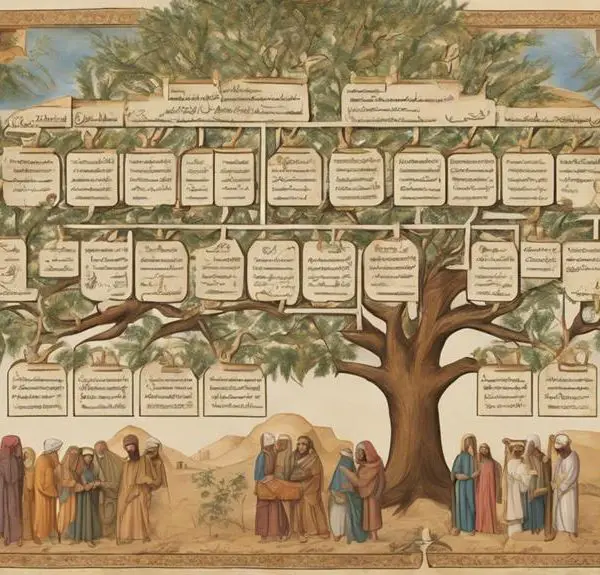Both Abigail and Jesus from the Bible showcase timeless wisdom and compassion, stirring curiosity about their intertwined lessons on leadership and crisis.

Abigail and Jesus in the Bible
Exploring the stories of Abigail and Jesus in the Bible is like unearthing hidden treasures in an ancient, sacred text.
You've probably heard of Jesus' life and teachings, which have shaped the bedrock of Christian faith.
However, Abigail's story, with her wisdom and diplomacy, offers equally profound lessons.
As you explore the parallels between these two figures, you'll uncover insights into how their stories echo modern themes of leadership, compassion, and intervention in times of crisis.
The intriguing question is how their narratives might intertwine and what that interplay teaches us about handling our own challenges today.
Key Takeaways
- Abigail and Jesus embody wisdom, empathy, and moral courage in conflict resolution.
- Both figures teach the importance of servant leadership and compassion.
- Their actions and teachings offer valuable lessons on diplomacy and ethical guidance.
- Abigail and Jesus' legacies continue to influence modern discussions on leadership and social justice.
The Story of Abigail

In the biblical narrative, Abigail emerges as a figure of wisdom and diplomacy, skillfully averting a crisis between her husband Nabal and the future king, David. This story, deeply embedded in the fabric of Judeo-Christian ethics, showcases a pivotal moment where personal virtues intercede in a potentially fatal conflict.
At the heart of this narrative is Nabal's folly, a reckless disregard for the customs of hospitality and respect, which ignites David's anger. Nabal's refusal to provide sustenance to David and his men, despite their protection of his flock, epitomizes a breach of the ancient Near Eastern standards of generosity and reciprocity.
David's response to Nabal's insult is swift and severe, promising retribution that threatens not just Nabal, but his entire household. It's within this volatile context that Abigail's actions underscore the importance of wisdom and the power of diplomacy. Her intervention isn't merely a plea for mercy; it's a calculated effort to restore balance and prevent bloodshed.
Abigail's approach reflects an understanding of the stakes involved and showcases her ability to navigate through a complex social and moral landscape, effectively quelling David's anger and averting a catastrophe.
Lessons From Abigail's Diplomacy
Abigail's adept negotiation with David reveals profound lessons in diplomacy and conflict resolution, demonstrating the timeless value of wisdom and tactful communication in averting crises. Through her story, we learn that effective negotiation and conflict resolution aren't just about winning an argument but about finding a peaceful solution that benefits all parties involved. Here are four key lessons from Abigail's diplomacy:
- Preparation is Key: Before approaching David, Abigail carefully prepared her words and gifts, showing that successful negotiation starts with thoughtful preparation.
- Empathy is Crucial: Abigail demonstrated empathy by acknowledging David's grievances, a vital element in resolving conflicts and understanding the other party's perspective.
- Courage to Speak Up: Despite the risk, Abigail had the courage to intervene, illustrating that sometimes, stepping into a conflict to mediate requires bravery.
- Wisdom Overcomes Anger: By using wise and respectful communication, Abigail was able to calm David's anger, proving that wisdom and calmness can defuse even the most heated situations.
These lessons underscore the importance of effective negotiation and conflict resolution techniques that are as relevant today as they were in biblical times.
Jesus' Life and Teachings

While exploring the diplomacy of Abigail provides valuable insights into conflict resolution, examining Jesus' life and teachings offers profound lessons on compassion, forgiveness, and moral leadership. His actions and words, documented in the New Testament, serve not just as historical accounts but as foundational elements for ethical guidance and spiritual enlightenment.
You'll find Jesus' miracles performed not merely as acts of divine power, but as teachings in themselves, emphasizing faith, hope, and the possibility of transformation. These miracles, ranging from healing the sick to feeding thousands with minimal resources, illustrate a deeper understanding of compassion and providence. They invite you to look beyond the physical manifestations to the spiritual messages they convey about trust in divine provision and care for one another.
Moreover, Jesus' parables explained complex moral and spiritual truths through simple, relatable stories. These narratives, rich in symbolism, challenge you to reflect on your values, decisions, and the nature of your relationships with others and the divine. Through parables, Jesus taught about forgiveness, the importance of acting with integrity, and the kingdom of God, offering insights that remain relevant and transformative for contemporary life.
Parallels Between Abigail and Jesus
Examining the accounts of Abigail and Jesus reveals striking similarities in their approaches to conflict resolution and moral courage, reflecting deep-seated values of compassion, wisdom, and proactive peacemaking. Both figures stand out in their historical and scriptural contexts for their exceptional servant leadership and their dedication to resolving disputes with grace and understanding.
Here are four key parallels:
- Intervention in Conflict: Both Abigail and Jesus intervened in volatile situations. Abigail's quick action prevented David from committing murder, while Jesus often stepped into disputes, offering wisdom that defused tensions.
- Wisdom in Speech: They employed wisdom and insight in their speech, persuading others to reconsider their actions. Abigail's appeal to David's better nature and Jesus' parables both served to guide others towards more peaceful resolutions.
- Compassion for Others: Their actions were motivated by a deep compassion for others, even those who might be considered enemies or unworthy of such consideration.
- Servant Leadership: Abigail and Jesus exemplified servant leadership, putting the needs and well-being of others before their own, often at great personal risk.
These parallels underscore a shared legacy of conflict resolution and moral fortitude, highlighting their enduring relevance in discussions on ethical leadership and peacemaking strategies.
Modern Implications of Their Stories

Reflecting on the parallels between Abigail and Jesus offers valuable insights into their impact on contemporary discussions of leadership and conflict resolution. Both figures, despite the vast differences in their cultural and historical contexts, showcase models of leadership characterized by wisdom, empathy, and proactive peacemaking. Their stories resonate with modern audiences, illuminating how effective leadership transcends time and cultural interpretations.
In examining their narratives through the lens of gender roles, one finds that Abigail's story challenges traditional expectations of women's roles in leadership and conflict resolution. Her assertive and wise intervention in a volatile situation contrasts with the often passive roles attributed to women in her time. This has implications for today's discussions on gender equality and the empowerment of women in leadership positions.
Similarly, the cultural interpretations of Jesus' teachings and actions continue to influence contemporary debates on moral leadership and social justice. His emphasis on compassion, forgiveness, and inclusivity challenges modern leaders to reflect on their approaches to governance and social cohesion.
Analyzing the stories of Abigail and Jesus, thus, not only enriches our understanding of biblical narratives but also contributes to ongoing conversations about leadership, gender roles, and conflict resolution in a modern context.
Frequently Asked Questions
How Does the Cultural Context of Abigail's Time Influence Our Understanding of Her Actions?
Understanding Abigail's actions requires delving into the cultural context of her time. Marital dynamics and political alliances played pivotal roles. You'll see her decisions weren't just personal; they were deeply rooted in societal expectations and the strategies needed to navigate them.
This analysis reveals how her moves weren't only about survival but also about leveraging her intelligence within the constraints of her era. It offers a nuanced view of her character.
Are There Any Historical Records Outside of the Bible That Mention Abigail or Give Insight Into Her Story?
You're looking for historical records outside of religious texts about Abigail. Unfortunately, archaeological evidence and genealogical research haven't produced concrete results linking directly to her story.
While these methods can provide insights into the era's culture and societal norms, specific references to Abigail in non-biblical records are scarce. This doesn't diminish her significance but highlights the challenges in correlating biblical narratives with archaeological and historical data.
How Do Different Christian Denominations Interpret Abigail's Role and Significance Differently?
You're diving into a fascinating exploration: how Christian denominations vary in their interpretation of Abigail's role and significance.
With each denomination's teachings, you'll uncover unique perspectives on Abigail's leadership. This isn't just a story; it's a lens through which the multifaceted nature of scriptural understanding unfolds.
Analyzing these differences isn't merely academic—it's a journey into the heart of faith diversity, where every insight adds depth to your scholarly quest.
What Are the Linguistic Nuances in the Original Texts That Might Affect the Interpretation of Abigail and Jesus' Stories?
When exploring linguistic nuances in original texts, you'll find grammatical gender and translation accuracy crucial. They significantly affect interpretations, as languages like Hebrew and Greek use gender-specific terms that may not align directly with English.
This discrepancy can lead to varied understandings, especially in historical or religious narratives. Analyzing these aspects is key to grasping the full context and intent behind the stories, ensuring a more accurate and insightful interpretation.
How Have Depictions of Abigail and Jesus in Art and Literature Evolved Over Time, and What Impact Does This Have on Modern Perceptions of Their Characters?
As you dive into the sea of history, you'll see that depictions of these figures in art and literature have morphed, reflecting shifts in artistic symbolism and gender perspectives.
This evolution shapes our modern view, inviting you to ponder their characters through a contemporary lens. Analyzing this transformation reveals how societal values and artistic trends have intertwined, casting new light on their stories and influencing how you perceive their legacies today.
Conclusion
In analyzing the narratives of Abigail and Jesus, it's evident that both exemplify transformative diplomacy and compassion, transcending their historical contexts into a modern ethos of conflict resolution and empathy.
Interestingly, Abigail's savvy negotiation skills could be likened to a biblical version of crisis management consultancy, highlighting the timeless relevance of their stories.
Their lives encourage a reflective examination of our approaches to adversity, advocating for a blend of wisdom, courage, and grace in navigating life's challenges.



Sign up